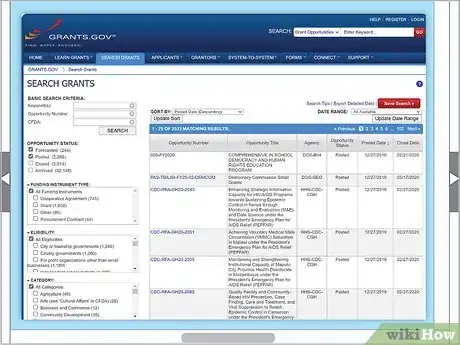This article was co-authored by Dmitriy Fomichenko and by wikiHow staff writer, Janice Tieperman. Dmitriy Fomichenko is the president of Sense Financial Services LLC, a boutique financial firm specializing in self-directed retirement accounts with checkbook control based in Orange County, California. With over 19 years of financial planning and advising experience, Dmitry assists and educates thousands of individuals on how to use self-directed IRA and Solo 401k to invest in alternative assets. He is the author of the book "IRA Makeover" and is a licensed California real estate broker.
There are 13 references cited in this article, which can be found at the bottom of the page.
This article has been viewed 20,660 times.
Non-governmental organizations (NGOs) are making a positive difference all over the world. Groups like AMREF and CARE International are 2 groups among many that have shown how powerful a single goal can be when it’s shared by a group of like-minded individuals.[1] Unfortunately, NGOs don’t generate any revenue on their own and require extensive funding to operate successfully. With careful planning and communication, you can be on your way to raise funds for your organization!
Steps
Using Crowdfunding Methods
-
1Create an account on a crowdfunding website. Set up a profile on a large crowdfunding site, like Kickstarter, GoFundMe or Indiegogo. These websites are easy to use and let anyone with a debit card and an Internet connection contribute to your cause. Another benefit is that crowdfunding platforms allow you to reach a lot of people at once. After you reach a certain goal, you can let your donors know through a post on the site![2]
- Sites like Crowdfunder, Chuffed, and Experiment are also great options to consider.
-
2Spread the word about your crowdfunding on social media. Create a social media presence for your NGO, such as a Facebook page. Facebook lets you post long messages that get sent to your followers’ news feed. If they‘re passionate enough about your cause, your followers might share and repost your messages and links onto their own profiles.[3]
- Twitter is effective as well—the only drawback is the character limit per tweet.
- Spread the word to your family and friends by sharing your NGO’s posts on your personal social media accounts.
Advertisement -
3Design a reward plan for anyone who donates. Create some incentives for people to support your NGO. While some people might donate out of the goodness of the heart, many people will want to get something in return. Think of rewards that are both small and big—depending on how large the potential prize is, you might be able to generate some more interest in your fundraising campaign.[4]
- While not an NGO, consider modeling your potential reward system around incentives, such as products with NGO’s name and logo on them.[5]
- Contact a financial speculator before you do this. While rewards are great, you don’t want an incentive program to dip into funds that you need to use to keep your NGO up and running.
Applying for Government Grants
-
1Research appropriate grants for your organization. Apply for a government grant that matches the ideals of your organization. This can be tricky, as there might not be a grant that perfectly aligns with your NGO’s mission. When you apply for a government grant, make sure that your NGO would be accomplishing the mission of the grant. Don’t worry if your NGO is based overseas—you may still be able to apply for certain grants in some countries, like the United States.[6]
- For instance, an NGO focused on youth outreach in Kenya shouldn’t be applying for a government grant focused on providing human rights support to Armenia.
- Check the official government website regarding grants to find specific funding opportunities: https://www.grants.gov/web/grants/search-grants.html.
-
2Assemble and submit the proper application forms. Send in your completed application for the government grant of your choice. In this technological age, most of these forms can be turned in digitally. Before submitting anything, make sure that you’ve assembled all the information and documents necessary for the application.[7]
- For instance, the Democracy Commission Small Grants Program Competition requires you to submit a CV, correspondence from any partner groups, registration documents, and more.[8]
-
3Continue applying, even if your past applications were denied. Keep submitting applications to different grant opportunities and competitions. Perseverance is a necessary ingredient to a successfully funded NGO, and the grant application process is no exception. See if the grant application form lists a contact—if so, consider reaching out to them with any questions you may have about the application process.[9]
- Consider asking about the waiting times for applications, and things you can include to make your application stand out.
Requesting Funds from a Corporate Company
-
1Find any common goals you have with the company. Search the company’s website and see if you can find a written copy of their mission statement. Do any of their values match up with the principles of your organization? If so, it might be worthwhile to open a dialogue with this group.[10]
- For example, an NGO focused on providing clean water for local communities might have similar goals to a water purification company.
- Check online and see if you can find a staff directory. Before you set up a meeting with the company, decide who you want to be speaking with. Try and find someone who deals with strategy for the company, as that could be an excellent starting point.
- Don’t hedge all of your hopes on one company. Reach out to multiple corporations that you feel could align with the interests of your NGO.
-
2Draft a reward plan for possible funders. Decide what you plan on giving potential donors should they agree to help fund your NGO. Most corporate groups need to stay focused on their own interests. Make an investment worth their while by hosting dinners or other special functions specifically for funders.[11]
- Contact someone who deals with the company’s financial strategy. They can give you some insight into what kind of reward or benefit the company would like best.
-
3Schedule a time to meet with relevant company leadership. Set a time and place to meet with the people who would be most able to greenlight funding to your NGO. Try and meet with someone who has authority over part of the company’s budget. If you aren’t sure who to reach out to, consider calling the main company number—a secretary might be able to give you some tips on the proper employee to contact.[12]
- Make a good impression by meeting the company representatives at their center of operations. If you’d prefer to meet at a neutral location, ask the corporate rep if they would be interested in doing so.
- Be sure to thank the company representatives for taking the time to see you.
-
4Prepare a pitch to demonstrate the worth of your NGO to the company. Explain from the beginning of your presentation why your organization is important, and how your work could positively benefit the corporation. Make sure that your pitch is well-researched so you can answer any potential questions that the company representatives might have. The potential investors will also want to know where their money is going—so make sure to have a good answer.[13]
- Don’t be afraid to play on the investor’s emotions throughout your pitch. Above all, potential donors want to give money to a cause that they believe in. For example, if you’re an NGO that’s trying to get clean water to impoverished communities, tell the story of a child who’s been negatively impacted by the effects of polluted water.
- Try to maintain consistent eye-contact throughout your presentation. It will come off as insincere and awkward if you’re constantly looking away.
-
5Follow up with the proper channels after the meeting. Don’t be upset if a company can’t fit your NGO into their budget—fundraising, as is the case with many aspects of business, is highly reliant on timing. Even if the company can’t donate to your NGO now, don’t give up on your efforts! Try again in a year or so and see if the company has room for you in their budget then.[14]
Expert Q&A
-
QuestionHow can I manage the finances of an NGO successfully?
 Dmitriy FomichenkoDmitriy Fomichenko is the president of Sense Financial Services LLC, a boutique financial firm specializing in self-directed retirement accounts with checkbook control based in Orange County, California. With over 19 years of financial planning and advising experience, Dmitry assists and educates thousands of individuals on how to use self-directed IRA and Solo 401k to invest in alternative assets. He is the author of the book "IRA Makeover" and is a licensed California real estate broker.
Dmitriy FomichenkoDmitriy Fomichenko is the president of Sense Financial Services LLC, a boutique financial firm specializing in self-directed retirement accounts with checkbook control based in Orange County, California. With over 19 years of financial planning and advising experience, Dmitry assists and educates thousands of individuals on how to use self-directed IRA and Solo 401k to invest in alternative assets. He is the author of the book "IRA Makeover" and is a licensed California real estate broker.
Financial Planner Do not rely on only one source of income. Try to create multiple sources of income for the organization.
Do not rely on only one source of income. Try to create multiple sources of income for the organization.
Warnings
- Don’t bite off more than you can chew. Start with something simpler like crowdfunding, and work your way up to corporate donations.⧼thumbs_response⧽
References
- ↑ https://www.ngoadvisor.net/top100ngos
- ↑ https://www.digitaltrends.com/cool-tech/best-crowdfunding-sites/
- ↑ https://www.fundsforngos.org/featured-articles/using-social-media-enhance-ngo-visibility/
- ↑ https://pulitzercenter.org/blog/should-you-run-ngo-business
- ↑ https://nonprofithub.org/nonprofit-technology/some-tips-for-kickstarter-and-nonprofits/
- ↑ https://blog.grants.gov/2019/01/25/fundingfriday-federal-grants-open-to-overseas-non-profits-and-non-government-organizations-ngos/#more-4159
- ↑ https://blog.grants.gov/2019/01/25/fundingfriday-federal-grants-open-to-overseas-non-profits-and-non-government-organizations-ngos/#more-4159
- ↑ https://www.grants.gov/web/grants/view-opportunity.html?oppId=311481
- ↑ https://www.openglobalrights.org/using-a-business-mindset-to-fund-advocacy-ngos-in-kyrgyzstan/
- ↑ https://www.weforum.org/agenda/2013/09/six-corporate-fundraising-tips-for-ngos/
- ↑ http://www.ngopulse.org/article/2015/07/15/67-fundraising-and-marketing-tips-npos
- ↑ https://www.weforum.org/agenda/2013/09/six-corporate-fundraising-tips-for-ngos/
- ↑ http://www.ngopulse.org/article/11-tips-when-pitching-your-social-enterprise
- ↑ https://www.weforum.org/agenda/2013/09/six-corporate-fundraising-tips-for-ngos/
- ↑ https://www.ngoadvisor.net/top100ngos
- ↑ https://www.weforum.org/agenda/2013/09/six-corporate-fundraising-tips-for-ngos/
- ↑ https://www.shrm.org/resourcesandtools/hr-topics/benefits/pages/philanthropy-volunteerism.aspx








































































